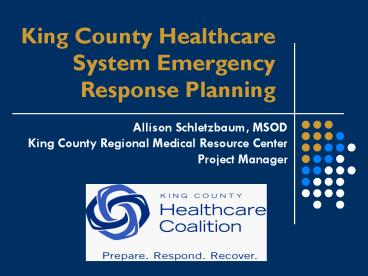King County Healthcare System Emergency Response Planning - PowerPoint PPT Presentation
1 / 14
Title:
King County Healthcare System Emergency Response Planning
Description:
EMS. Medical. Director. Medical Examiner. Operations Section ... Identifying, tracking, and distributing medical resources. Communications and coordination ... – PowerPoint PPT presentation
Number of Views:52
Avg rating:3.0/5.0
Title: King County Healthcare System Emergency Response Planning
1
King County Healthcare System Emergency Response
Planning
Allison Schletzbaum, MSOD King County Regional
Medical Resource Center Project Manager
2
Healthcare in King County
- There is no healthcare system
- 23 hospitals 18 w/EDs
- 30 Community Health Clinics
- Unknown number of clinics and private doctors
- 2 tribal clinics
- 1100 long term residential care facilities
- 7000 individuals utilizing home care and home
health services
3
Role of Public Health
- Lead for Emergency Support Function 8 (ESF-8)
Health and Medical Support - Neutral party in a competitive healthcare market
- Local health officer has authority based on the
Washington Administrative Code
4
Coordinating Countywide Health System Response
Strengths
- Emergency management system in place for King
County agencies and larger cities - Public Health, hospitals, first responders, EM
partners have been preparing together for years - Strong health care assets including Emergency
Medical System, Hospital Control, Public Health
response
5
Coordinating Countywide Health System Response
Weaknesses
- Planning has traditionally been hospital-centric,
not health care system-oriented - Need for a Unified Command approach to manage the
health and medical response - Health care system response capabilities appear
inadequate for large-scale or catastrophic
disasters - Limited capacity in the healthcare system, not
set up for surge in demand
6
King County Healthcare Coalition
- The King County Healthcare Coalition is a network
of healthcare organizations and providers that
are committed to coordinating their emergency
preparedness and response activities - The purpose of the Coalition is to develop and
maintain a comprehensive system that assures
coordination, effective communications, and
optimal use of available health resources in
response to emergencies and disaster for all
hazards
7
(No Transcript)
8
Proposed Unified Command Structure ESF-8
Local Health Officer
Healthcare Coalition Executive Council
EMS Medical
Director
Medical Examiner
Unified Command
Medical Advisors
Joint Information Center
Legal Advisors
Public Health EOC Liaison
Operations Section Chief
Planning Section Chief
Logistics Section Chief
Admin Section Chief
9
Health Sector Engagement
- Hospitals
- Medical Groups
- Safety Net Providers
- Home Health
- Long Term Care
- Mental Health
- Specialty Providers
- Pediatrics
10
Coalition Preparedness Structure
11
Regional Medical Resource Center
- Supports the objectives of the Public Health EOC,
the Coalition Executive Council, and Unified
Command - Provides situational awareness for the healthcare
system - Anticipates needs, monitors available resources
and coordinates deployment where needed during
emergencies
- Acquiring Image Trend Incident Management
Software with ASPR funds to support RMRC
12
Current Regional Planning Priorities
- Alternate Care Facilities
- Triggers
- Track patients and staff
- Puget Sound Call Center Coordination
- Distribute standardized guidelines
- Integrate medial and business call centers
- Health Sector Operational Planning
- Communication Protocols
- Public and Private Sector Coordination
13
Regional Challenges
- Situation Awareness
- Healthcare Providers
- Vulnerable Populations
- Critical Infrastructure
- Identifying, tracking, and distributing medical
resources - Communications and coordination
- Tracking disaster expenditures
14
Questions? Contact Us
- Allison Schletzbaum, MSOD
- RMRC Project Manager
- aschletz_at_u.washington.edu
- (206) 731-6213
- Cynthia Dold, MPP, MPH
- Healthcare Coalition Program Manager
- cynthia.dold_at_metrokc.gov
- (206) 205-0456































